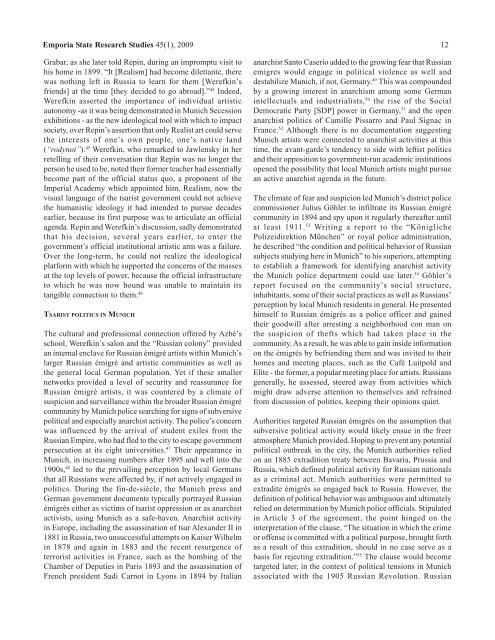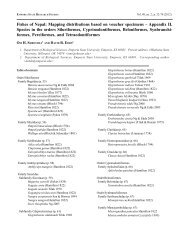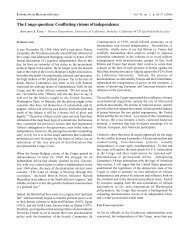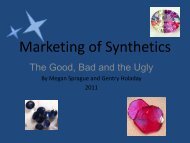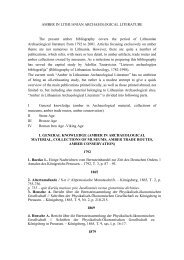Russian émigré artists and political opposition in fin-de-siècle Munich
Russian émigré artists and political opposition in fin-de-siècle Munich
Russian émigré artists and political opposition in fin-de-siècle Munich
- No tags were found...
You also want an ePaper? Increase the reach of your titles
YUMPU automatically turns print PDFs into web optimized ePapers that Google loves.
Emporia State Research Studies 45(1), 2009 12Grabar, as she later told Rep<strong>in</strong>, dur<strong>in</strong>g an impromptu visit tohis home <strong>in</strong> 1899. “It [Realism] had become dilettante, therewas noth<strong>in</strong>g left <strong>in</strong> Russia to learn for them [Werefk<strong>in</strong>’sfriends] at the time [they <strong>de</strong>ci<strong>de</strong>d to go abroad].” 44 In<strong>de</strong>ed,Werefk<strong>in</strong> asserted the importance of <strong>in</strong>dividual artisticautonomy -as it was be<strong>in</strong>g <strong>de</strong>monstrated <strong>in</strong> <strong>Munich</strong> Secessionexhibitions - as the new i<strong>de</strong>ological tool with which to impactsociety, over Rep<strong>in</strong>’s assertion that only Realist art could servethe <strong>in</strong>terests of one’s own people, one’s native l<strong>and</strong>(“rodynoi”). 45 Werefk<strong>in</strong>, who remarked to Jawlensky <strong>in</strong> herretell<strong>in</strong>g of their conversation that Rep<strong>in</strong> was no longer theperson he used to be, noted their former teacher had essentiallybecome part of the official status quo, a proponent of theImperial Aca<strong>de</strong>my which appo<strong>in</strong>ted him. Realism, now thevisual language of the tsarist government could not achievethe humanistic i<strong>de</strong>ology it had <strong>in</strong>ten<strong>de</strong>d to pursue <strong>de</strong>ca<strong>de</strong>searlier, because its first purpose was to articulate an officialagenda. Rep<strong>in</strong> <strong>and</strong> Werefk<strong>in</strong>’s discussion, sadly <strong>de</strong>monstratedthat his <strong>de</strong>cision, several years earlier, to enter thegovernment’s official <strong>in</strong>stitutional artistic arm was a failure.Over the long-term, he could not realize the i<strong>de</strong>ologicalplatform with which he supported the concerns of the massesat the top levels of power, because the official <strong>in</strong>frastructureto which he was now bound was unable to ma<strong>in</strong>ta<strong>in</strong> itstangible connection to them. 46TSARIST POLITICS IN MUNICHThe cultural <strong>and</strong> professional connection offered by Azbé’sschool, Werefk<strong>in</strong>’s salon <strong>and</strong> the “<strong>Russian</strong> colony” provi<strong>de</strong>dan <strong>in</strong>ternal enclave for <strong>Russian</strong> <strong>émigré</strong> <strong>artists</strong> with<strong>in</strong> <strong>Munich</strong>’slarger <strong>Russian</strong> <strong>émigré</strong> <strong>and</strong> artistic communities as well asthe general local German population. Yet if these smallernetworks provi<strong>de</strong>d a level of security <strong>and</strong> reassurance for<strong>Russian</strong> <strong>émigré</strong> <strong>artists</strong>, it was countered by a climate ofsuspicion <strong>and</strong> surveillance with<strong>in</strong> the broa<strong>de</strong>r <strong>Russian</strong> <strong>émigré</strong>community by <strong>Munich</strong> police search<strong>in</strong>g for signs of subversive<strong>political</strong> <strong>and</strong> especially anarchist activity. The police’s concernwas <strong>in</strong>fluenced by the arrival of stu<strong>de</strong>nt exiles from the<strong>Russian</strong> Empire, who had fled to the city to escape governmentpersecution at its eight universities. 47 Their appearance <strong>in</strong><strong>Munich</strong>, <strong>in</strong> <strong>in</strong>creas<strong>in</strong>g numbers after 1895 <strong>and</strong> well <strong>in</strong>to the1900s, 48 led to the prevail<strong>in</strong>g perception by local Germansthat all <strong>Russian</strong>s were affected by, if not actively engaged <strong>in</strong>politics. Dur<strong>in</strong>g the f<strong>in</strong>-<strong>de</strong>-<strong>siècle</strong>, the <strong>Munich</strong> press <strong>and</strong>German government documents typically portrayed <strong>Russian</strong><strong>émigré</strong>s either as victims of tsarist oppression or as anarchistactivists, us<strong>in</strong>g <strong>Munich</strong> as a safe-haven. Anarchist activity<strong>in</strong> Europe, <strong>in</strong>clud<strong>in</strong>g the assass<strong>in</strong>ation of tsar Alex<strong>and</strong>er II <strong>in</strong>1881 <strong>in</strong> Russia, two unsuccessful attempts on Kaiser Wilhelm<strong>in</strong> 1878 <strong>and</strong> aga<strong>in</strong> <strong>in</strong> 1883 <strong>and</strong> the recent resurgence ofterrorist activities <strong>in</strong> France, such as the bomb<strong>in</strong>g of theChamber of Deputies <strong>in</strong> Paris 1893 <strong>and</strong> the assass<strong>in</strong>ation ofFrench presi<strong>de</strong>nt Sadi Carnot <strong>in</strong> Lyons <strong>in</strong> 1894 by Italiananarchist Santo Caserio ad<strong>de</strong>d to the grow<strong>in</strong>g fear that <strong>Russian</strong>emigres would engage <strong>in</strong> <strong>political</strong> violence as well <strong>and</strong><strong>de</strong>stabilize <strong>Munich</strong>, if not, Germany. 49 This was compoun<strong>de</strong>dby a grow<strong>in</strong>g <strong>in</strong>terest <strong>in</strong> anarchism among some German<strong>in</strong>tellectuals <strong>and</strong> <strong>in</strong>dustrialists, 50 the rise of the SocialDemocratic Party [SDP] power <strong>in</strong> Germany, 51 <strong>and</strong> the openanarchist politics of Camille Pissarro <strong>and</strong> Paul Signac <strong>in</strong>France. 52 Although there is no documentation suggest<strong>in</strong>g<strong>Munich</strong> <strong>artists</strong> were connected to anarchist activities at thistime, the avant-gar<strong>de</strong>’s ten<strong>de</strong>ncy to si<strong>de</strong> with leftist politics<strong>and</strong> their <strong>opposition</strong> to government-run aca<strong>de</strong>mic <strong>in</strong>stitutionsopened the possibility that local <strong>Munich</strong> <strong>artists</strong> might pursuean active anarchist agenda <strong>in</strong> the future.The climate of fear <strong>and</strong> suspicion led <strong>Munich</strong>’s district policecommissioner Julius Göhler to <strong>in</strong>filtrate its <strong>Russian</strong> <strong>émigré</strong>community <strong>in</strong> 1894 <strong>and</strong> spy upon it regularly thereafter untilat least 1911. 53 Writ<strong>in</strong>g a report to the “KöniglichePolizeidirektion München” or royal police adm<strong>in</strong>istration,he <strong>de</strong>scribed “the condition <strong>and</strong> <strong>political</strong> behavior of <strong>Russian</strong>subjects study<strong>in</strong>g here <strong>in</strong> <strong>Munich</strong>” to his superiors, attempt<strong>in</strong>gto establish a framework for i<strong>de</strong>ntify<strong>in</strong>g anarchist activitythe <strong>Munich</strong> police <strong>de</strong>partment could use later. 54 Göhler’sreport focused on the community’s social structure,<strong>in</strong>habitants, some of their social practices as well as <strong>Russian</strong>s’perception by local <strong>Munich</strong> resi<strong>de</strong>nts <strong>in</strong> general. He presentedhimself to <strong>Russian</strong> <strong>émigré</strong>s as a police officer <strong>and</strong> ga<strong>in</strong>edtheir goodwill after arrest<strong>in</strong>g a neighborhood con man onthe suspicion of thefts which had taken place <strong>in</strong> thecommunity. As a result, he was able to ga<strong>in</strong> <strong>in</strong>si<strong>de</strong> <strong>in</strong>formationon the <strong>émigré</strong>s by befriend<strong>in</strong>g them <strong>and</strong> was <strong>in</strong>vited to theirhomes <strong>and</strong> meet<strong>in</strong>g places, such as the Café Luitpold <strong>and</strong>Elite - the former, a popular meet<strong>in</strong>g place for <strong>artists</strong>. <strong>Russian</strong>sgenerally, he assessed, steered away from activities whichmight draw adverse attention to themselves <strong>and</strong> refra<strong>in</strong>edfrom discussion of politics, keep<strong>in</strong>g their op<strong>in</strong>ions quiet.Authorities targeted <strong>Russian</strong> <strong>émigré</strong>s on the assumption thatsubversive <strong>political</strong> activity would likely ensue <strong>in</strong> the freeratmosphere <strong>Munich</strong> provi<strong>de</strong>d. Hop<strong>in</strong>g to prevent any potential<strong>political</strong> outbreak <strong>in</strong> the city, the <strong>Munich</strong> authorities reliedon an 1885 extradition treaty between Bavaria, Prussia <strong>and</strong>Russia, which <strong>de</strong>f<strong>in</strong>ed <strong>political</strong> activity for <strong>Russian</strong> nationalsas a crim<strong>in</strong>al act. <strong>Munich</strong> authorities were permitted toextradite <strong>émigré</strong>s so engaged back to Russia. However, the<strong>de</strong>f<strong>in</strong>ition of <strong>political</strong> behavior was ambiguous <strong>and</strong> ultimatelyrelied on <strong>de</strong>term<strong>in</strong>ation by <strong>Munich</strong> police officials. Stipulated<strong>in</strong> Article 3 of the agreement, the po<strong>in</strong>t h<strong>in</strong>ged on the<strong>in</strong>terpretation of the clause, “The situation <strong>in</strong> which the crimeor offense is committed with a <strong>political</strong> purpose, brought forthas a result of this extradition, should <strong>in</strong> no case serve as abasis for reject<strong>in</strong>g extradition.” 55 The clause would becometargeted later, <strong>in</strong> the context of <strong>political</strong> tensions <strong>in</strong> <strong>Munich</strong>associated with the 1905 <strong>Russian</strong> Revolution. <strong>Russian</strong>


